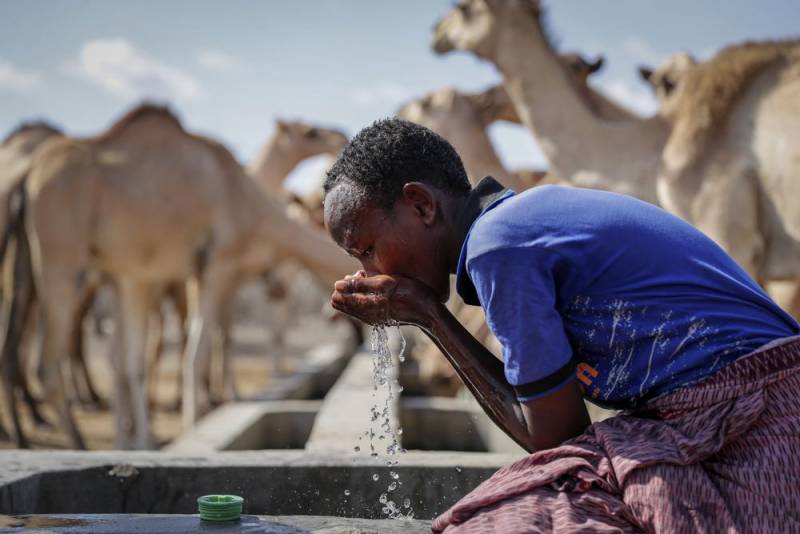Despite contributing relatively little to global greenhouse gas emissions, Africa has experienced some of the worst effects of climate change, including famine and flooding.
Yet, according to a new United Nations report, the effects of human-caused global warming will only worsen, from its coral reefs to its highest peaks.
In the coming decades, the United Nations Intergovernmental Panel on Climate Change predicts that Saharan flooding, heat, and drought will worsen, Africa's diverse fauna and plants will diminish, and glaciers on its most iconic mountains will vanish. Safari Mbuvi, a Kenyan farmer, has already struggled to survive his country's four-year drought — and has seen his crops fail time and time again.
“Since I was young, my father used to get a bounty harvest in this farm, but now, there seems to be a change in climate and the rains are no longer dependable,” he said. “I will not harvest anything, not even a single sack of maize is possible. ... And I am not the only one. Every farmer in this area has lost everything.”
Warming temperatures will weaken Africa’s food production system by leading to water scarcity and shorter growing seasons, the U.N. report said. Yields of olives, sorghum, coffee, tea and livestock production are expected to decline.
Climate change, along with conflicts, instability and economic crises, has contributed to hunger. Since 2012, the undernourished population in sub-Saharan Africa has increased by 45.6%, according to the U.N. Food and Agriculture Organization. And in 2020, approximately 98 million people suffered from acute food insecurity and needed humanitarian assistance in Africa, said the Global Report on Food Crises by the World Food Programme.
According to the IPCC, if the world warms by just one degree Celsius (1.8 degrees Fahrenheit) by 2050, an additional 1.4 million African children will be severely stunted due to starvation, which will impair their growth and cognitive development.
"Food insecurity and malnutrition are significantly linked to hot weather in Sub-Saharan Africa and lower rainfall in West and Central Africa," the panel wrote in a FAQ paper. "Climate change has the potential to degrade children's educational performance, limiting their chances of finding well-paying employment or earning greater wages later in life."
According to former Ireland President Mary Robinson, who is currently with The Elders, a Nelson Mandela-founded organization of senior statesmen, climate change has a significant social injustice component, with the poor being disproportionately affected by pollution from the wealthy. "All of the wrongdoings are captured by looking at the region of Africa.”
Drought is a problem that hits the continent particularly hard. While only 7% of the world’s disasters were drought related, they caused slightly more than one-third of the disaster deaths, “mostly in Africa,” the IPCC report said.
Droughts have also reduced Africa’s hydropower by about 5% compared to the long-term average, hindering growth, the report said.
"When we look at the repercussions, it's not just that Africa is suffering from droughts and cyclones, but also from sea level rise and disturbance of rainfall patterns," said Katharine Hayhoe, chief scientist for The Nature Conservancy in Canada. "It's because their susceptibility is so much greater than it is in many other locations."
According to scientists, it is hard to separate Africa's poverty from the effects of climate change.
"Africa gets a raw deal because it's more subject to physical repercussions in some respects, but also because there will be a lot of people living on less than a dollar a day," said climate scientist Zeke Hausfather of the Breakthrough Institute. Monday’s report said sea-surface temperatures are projected to rise, threatening fragile marine ecosystems, including East African coral reefs. The report warns of threats posed to livelihoods of 12.3 million people who depend on fisheries.
The report said global warming also will hit Africa’s famous wildlife and highest mountains. It predicted glacier ice covers on the Ruwenzori Mountains and Mount Kenya would be gone by 2030 and that Mount Kilimanjaro would lose its around 2040.
It was stated that Sub-Saharan Africa is the only region where flood fatality has increased since 1990, and that millions of people were evacuated due to weather-related causes in 2018 and 2019.
"Many cities are entirely unprepared for the magnitude of the challenges ahead, or are deliberately contributing to the worsening of the situation," said Kaisa Kosonen, senior policy advisor at Greenpeace Nordic. "Real climate change action necessitates resilient urban development and justice."




